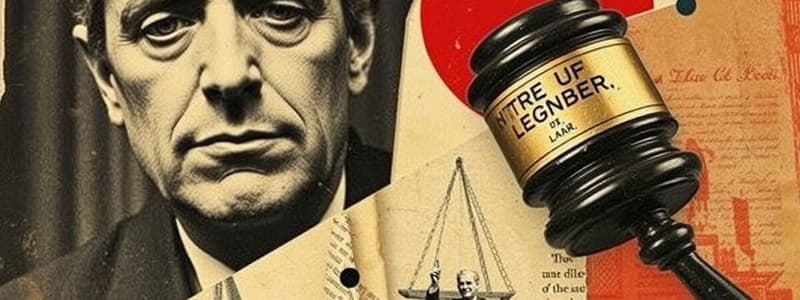Podcast
Questions and Answers
What was the main issue in Goldberg v. Kelly?
What was the main issue in Goldberg v. Kelly?
Whether the due process rights of Mr. Kelly, a public welfare beneficiary, had been violated by his denial of benefits without a predetermination evidentiary hearing.
In the Supreme Court's view as explained in Goldberg v. Kelly, are welfare benefits considered property rights protected by the Due Process clauses of the US Constitution?
In the Supreme Court's view as explained in Goldberg v. Kelly, are welfare benefits considered property rights protected by the Due Process clauses of the US Constitution?
True (A)
In Goldberg v. Kelly, the Court held that welfare recipients are entitled to:
In Goldberg v. Kelly, the Court held that welfare recipients are entitled to:
- Notice of reasons for termination
- A predetermination evidentiary hearing
- A decision by a neutral decision maker
- All of the above (correct)
True or False: In Goldberg v. Kelly, the Court states that some governmental benefits may be terminated without a hearing.
True or False: In Goldberg v. Kelly, the Court states that some governmental benefits may be terminated without a hearing.
What was the main issue in Sniadach v. Family Finance Corp.?
What was the main issue in Sniadach v. Family Finance Corp.?
In Sniadach v. Family Finance Corp, what did the Court state was, at minimum, necessary to avoid a due process violation in this situation?
In Sniadach v. Family Finance Corp, what did the Court state was, at minimum, necessary to avoid a due process violation in this situation?
What was the main issue in Fuentes v. Shevin?
What was the main issue in Fuentes v. Shevin?
Which of the following statements best summarizes reasoning by the Court in Fuentes v. Shevin?
Which of the following statements best summarizes reasoning by the Court in Fuentes v. Shevin?
What was the main issue in Mathews v. Eldridge?
What was the main issue in Mathews v. Eldridge?
Which of the following are included in the Mathews v. Eldridge balancing test laid out by the Court?
Which of the following are included in the Mathews v. Eldridge balancing test laid out by the Court?
In Brady v. Maryland, what did the Court hold that due process requires in a criminal case?
In Brady v. Maryland, what did the Court hold that due process requires in a criminal case?
All but which statement constitutes the Court's reasoning in Brady?
All but which statement constitutes the Court's reasoning in Brady?
The proportionality language in Rule 26(b) (as discussed in Robertson v. People Magazine) requires the court to balance competing interests in discovery requests.
The proportionality language in Rule 26(b) (as discussed in Robertson v. People Magazine) requires the court to balance competing interests in discovery requests.
What materials are subject to discovery under Rule 26(b)(1)?
What materials are subject to discovery under Rule 26(b)(1)?
In Robertson v. People Magazine, the Court determined the plaintiff's discovery requests were:
In Robertson v. People Magazine, the Court determined the plaintiff's discovery requests were:
In Connick v. Thompson, the majority opinion holds that lack of training for the young lawyers in Brady violations is:
In Connick v. Thompson, the majority opinion holds that lack of training for the young lawyers in Brady violations is:
What was the issue the Court decided in Gideon v. Wainwright?
What was the issue the Court decided in Gideon v. Wainwright?
Which of the following is NOT a rule developed by the majority in Strickland v. Washington?
Which of the following is NOT a rule developed by the majority in Strickland v. Washington?
The majority opinion of Morrissey v. Brewer contains all but which of the following?
The majority opinion of Morrissey v. Brewer contains all but which of the following?
Which of the following best states the rule from Lassiter v. Dep't of Social Services?
Which of the following best states the rule from Lassiter v. Dep't of Social Services?
Flashcards are hidden until you start studying
Study Notes
Goldberg v. Kelly
- Central issue: Violation of due process rights for Mr. Kelly, a public welfare recipient, denied benefits without a hearing.
- Court decision: Welfare benefits are recognized as property rights under the Due Process clauses of the US Constitution.
- Entitlements for welfare recipients include: notice of termination reasons, evidentiary hearing before termination, and decision by a neutral party.
- The Court affirms some governmental benefits can be terminated without a hearing.
Sniadach v. Family Finance Corp.
- Main issue: Violation of Ms. Sniadach's due process rights due to wage garnishment without prior challenge opportunity.
- Court ruling: Basic requirement for due process includes notice and a prior hearing.
Fuentes v. Shevin
- Central issue: Violation of Ms. Fuentes' due process rights due to repossession of property without a chance to contest the action.
- Court reasoning: Possessing title is not necessary to recognize a property interest; a possessory interest suffices.
Mathews v. Eldridge
- Key issue: Violation of Mr. Mathews' due process rights due to loss of social security benefits without an in-person hearing.
- Mathews v. Eldridge balancing test involves: private interest affected, risk of erroneous deprivation, and government burdens of additional procedures.
Brady v. Maryland
- Court ruling: Due process mandates prosecution disclosure of evidence favorable to the defendant or affecting sentencing.
- Court reasoning excludes the assertion that suppression of evidence does not violate the Due Process clause.
Robertson v. People Magazine
- Rule 26(b) requires balancing interests in discovery requests between fairness and efficiency.
- Discovery materials must be: non-privileged, relevant to claims or defenses, and proportional to the case needs.
- Court's finding: Plaintiff's discovery requests were excessive and irrelevant to discrimination claims.
Connick v. Thompson
- The opinion asserts that lack of training on Brady violations for young lawyers is acceptable due to their inherent competence.
Gideon v. Wainwright
- Core issue: Applicability of the 6th Amendment right to appointed counsel to state courts.
Strickland v. Washington
- A key rule: Ineffective assistance of counsel cannot be established simply through a checklist approach.
Morrissey v. Brewer
- Majority opinion states that due process requirements do apply to parole revocation cases.
Lassiter v. Department of Social Services
- Important ruling: Defines conditions under which an indigent individual's right to counsel must be provided in civil cases (full context not provided).
Studying That Suits You
Use AI to generate personalized quizzes and flashcards to suit your learning preferences.




